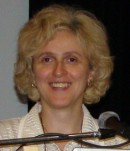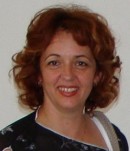
Plenary Lecture
Breaking the Boundaries of eLearning Systems through Creativity


Professors Monica Leba & Andreea Ionica
University of Petrosani
ROMANIA
E-mail: monicaleba@yahoo.com
Abstract: There are several previous approaches regarding the relationship between the eLearning systems and the creativity, but from the point of view of eLearning systems that can stimulate the creativity. We want to complete this relationship adding the use of creativity to improve the eLearning systems.
We believe that a bi-univocal relation between the eLearning systems and the creativity could lead to eLearning systems with a significant intelligence level.
Our research started from noticing a resemblance between the robots evolution classified in generations and the eLearning systems evolution classified in versions. Are there enough premises to be able to speak about eLearning systems generations?
The answer will come easily from the comparative analysis between the generations of robot systems development and the versions of eLearning systems.
So, the first generation of robots consists of using fixed sequence programs. The first version of eLearning systems consists of creating, designing, and managing courses, as well as supporting content delivery, user registration, monitoring, and certification. The focus of this version is on content and learning objects, with less consideration for the learning process, communication and collaboration. In conclusion, the first version of eLearning systems consists of a fixed content developed by the instructor and delivered to the learner.
The second generation of robots consists of using programmable controllers that can implement simple adaptive algorithms. The second version of eLearning systems consists of interactive courses. eLearning 2.0 is about creating and sharing information and knowledge with others using social media tools like blogs, wikis, social bookmarking and social networks within an educational or training context to support collaborative approach to learning. In conclusion, the second version of eLearning systems consists of adaptive content to the users’ needs.
The third generation of robots consists of smart robots that can decide the best way to accomplish a task based on the general information. The third version of eLearning systems is yet to come. We believe that this third version should consist of smart eLearning systems that learn to know each user and personalize the relationship between the instructor, learner and system, in order to decide the best way to deliver the proper learning environment. Albert Einstein said that “Imagination is more important than knowledge. Knowledge is limited. Imagination encircles the world.” The imagination is strongly related to the creativity. So came another wonder “Could creativity play a leading role in the third generation of eLearning systems!?”
Creativity is considered a resource that “waits” to be discovered. In our work, the students have a high creativity potential. Our goal is not only to teach them, but to help them discover things. Professors and students together can create and develop an attractive and useful eContent. Let’s imagine the “tomorrow” of the eLearning systems and the future Creative Intelligent eLearning Systems (CIeLS).
Tomorrows is looking today for the perspective of the eLearning systems.
Tomorrow is tickling the creativity and integrating it in the eLearning systems.
Tomorrow is using intelligent tools for the eLearning systems.
Tomorrow is ensuring the quality of the processes integrated in the eLearning systems.
Tomorrow is applying the principles of learner centered teaching in the eLearning systems.
In order to reach this “tomorrow” we know that there already exist a lot of information systems that can be successfully employed in eContent development having a certain degree of adaptability.
Nevertheless, in order to make the big step towards the Creative Intelligent eLearning Systems, we must integrate the creativity tools and methods in all the development phases, starting from the design of the eContent and ending with the evaluation. For example, some simple creativity tools that could be implemented are: automatic writing for keywords identification, course map drawing based on the identified keywords, telling the story of the course based on the map and so on.
It is well known that for any project of new system before the execution phase there must always be a simulation phase. This simulation phase ensures the correctness and viability of the system.
For the technical systems there are many instruments and acknowledged environments that can simulate any system based on its mathematical model.
For the information systems the simulation consists in determining whether the system meets the users’ expectations. For this reason we use a software evaluation tool that we have designed and achieved based on Quality Function Deployment (QFD) method. This software tool was applied on an existent modern eLearning system having its own eContent development instruments. There were identified the users’ requests (professors and students) and the technical characteristics of the system. The output of the evaluation is an offset representing the degree of requirements accomplishment. We have obtained for the considered eLearning system an offset of approximately 60%. This offset is not at all insignificant, but it can be surely improved by the integration of creativity in the eLearning system.
The simulated evaluation of the Creative Intelligent eLearning System using the QFD based software tool proves that in our opinion the creativity will play a leading role in the third generation of eLearning systems.
Brief Biography of the Speaker: Monica Leba: Received a BSc in System Control and Applied Informatics Engineering in 1998, a MSc in Information Systems and Technologies in 2007 and gained a PhD in System Control in 2002. She joined in 1999 the University of Petrosani. In 2008 became Associated Professor of System Control Engineering. She is member of IFAC (International Federation of Automatic Control), Technical Committee 3.1. Computers for Control. She was Invited Lecturer at the University of Clausthal – Germany, University of Nancy – France and University of Malaga – Spain. She was a Leonardo da Vinci researcher at the Biosensors Department from the University of Florence, Italy. Her general research interests are in applied informatics, algorithms design, modelling and simulation, computer and system control engineering. She took part and coordinated about 20 national and international research projects and grants, three of them having eLearning related theme. She published about 80 papers, part of them in WSEAS conferences. She also presented three plenary lectures in WSEAS conferences in Corfu, Greece, October, 2008, in Istanbul, Turkey, June, 2009 and in Malta, September, 2012. Recently, she participated at the Creativity Workshop in Florence.
Andreea Ionica: Graduated the University of Petrosani as engineer (1992), as economist (2002) and PhD in Industrial Engineering (2004). She got a postgraduate degree in Enterprises’ Economy and Administration from Institut National Polytechnique de Lorraine, France (1998). She also graduated the course of Human Resources Management (1999). She is currently Associated Professor in the Management Department at University of Petrosani where she teaches mainly in the areas of Management and Quality Management. Her research interests include: Quality Management Systems (QMS), TQM implementation, the study of customer - supplier relationship in the context of the QMS implementation. She activates in the field of quality management systems, being auditor and Quality Management Representative at the University of Petrosani. In the period 2010-2012 she coordinated a Grundtvig project with partners from Turkey, Romania, Nederland, Belgium and Germany. She participated as coordinator or member in about 10 national and international research projects, two of them having eLearning related theme, and grants and published about 100 papers. She also presented a plenary lecture in WSEAS conference in Malta, September, 2012. Recently, she participated at the Creativity Workshop in Florence.